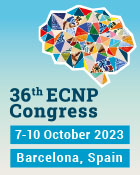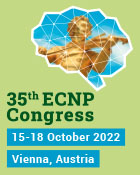ECNP Congresses

The annual ECNP Congress is Europe’s largest meeting in applied and translational neuroscience.
Held every autumn, the ECNP Congress brings together psychiatrists, neuroscientists, neurologists and psychologists from around the world to discuss the latest developments in the science and treatment of brain disorders.
With nearly 7,000 participants, the ECNP Congress is Europe’s premier showcase for new research, treatments and technologies in applied brain science. Spanning the spectrum of human mood, behaviour, cognition and emotion, from basic science to clinical care, the ECNP Congress brings you the best in CNS innovation.
The ECNP Congress is for everyone with an interest in:
- Treatment research in psychiatry, neurology and psychology
- Mental health care
- Discoveries in neuroscience and neurobiology
- The latest developments in industry innovation
- Public policy and regulation
- Patient issues
Discover the future of CNS treatments. Join us at the ECNP Congress!
Keynote and Plenary speakers
This year's ECNP Congress features an outstanding line-up of confirmed Keynote and Plenary Lectures. Discover them here!
Please note that the Plenary Lectures listed are those confirmed so far, with more exciting announcements to come!
Registration is open!
Save by registering on or before 21 May. Visit this page for more details on how to register, fees and special rates.
Call for abstracts
Share your research and boost your career, submit an abstract for poster presentation for #ECNP2025! Read more.
Call for proposals
Deadline is 13 May 2025.
Religious festivals
In scheduling the ECNP Congress, ECNP takes account of the religious festivals of all the major European faiths. However, because not all dates are always available to us, overlaps are very occasionally unavoidable. In these situations, we make great efforts to ensure that the overlap – and any inconvenience to our participants – is as minimal as possible.
Highlights of the ECNP Congress
Exhibition and Welcome Reception


Plenary Lecture and Registration Area


Poster Sessions and Keynote Lecture


Future ECNP Congresses
Visit this page to discover the upcoming destinations.
Past ECNP Congresses



Want to know all about past ECNP Congresses? Please visit our
history pages.